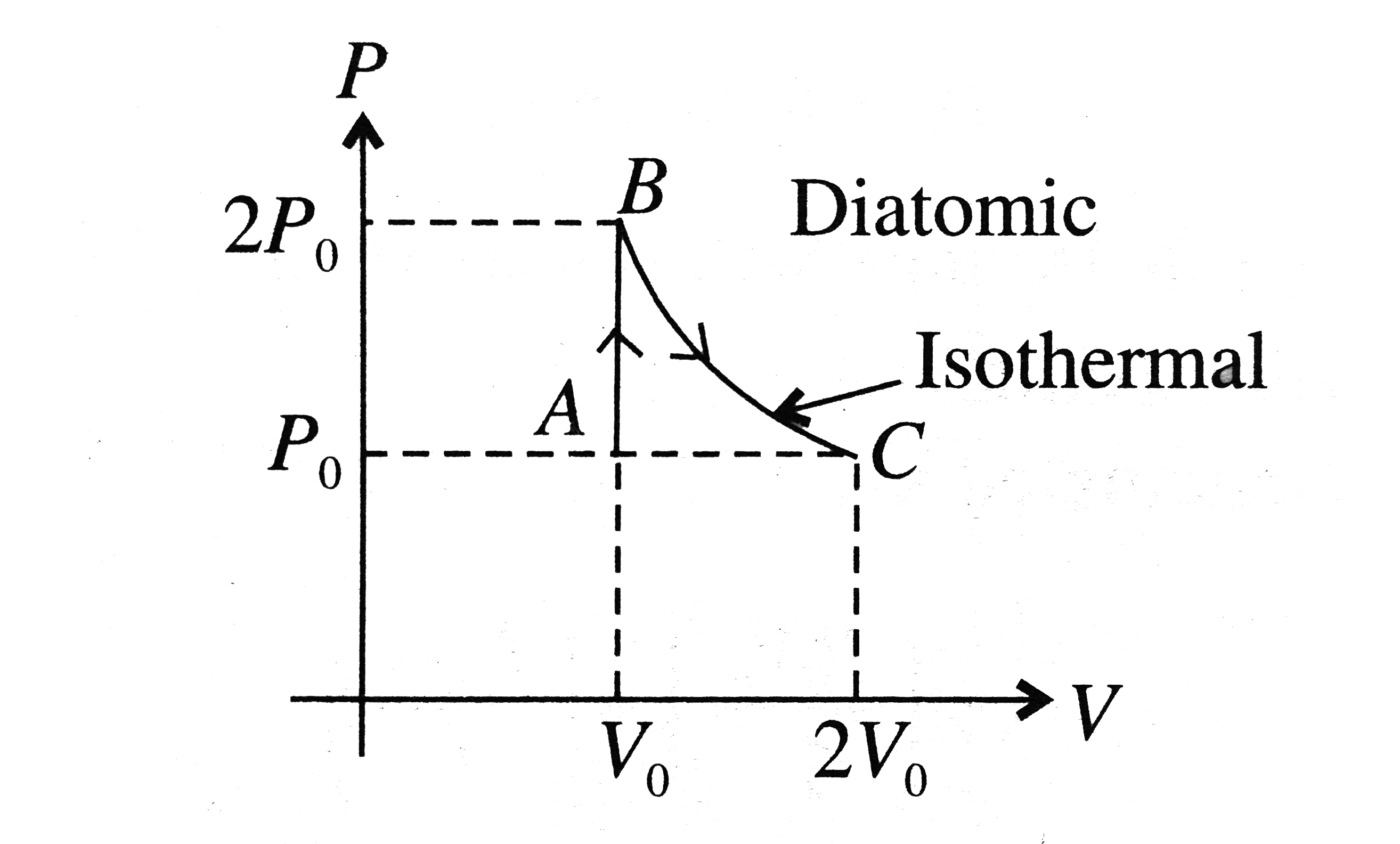A diatomic gas (γ=1.4) does 200 J of work when it is expanded isobarically. Find the heat given to the gas in the process.
To solve the problem of finding the heat given to a diatomic gas during an isobaric expansion, we can follow these steps:
Step 1: Understand the Given Information
We know that:
- The work done by the gas during the isobaric expansion, ΔW=200J
- The specific heat ratio for a diatomic gas, γ=1.4
Step 2: Identify Relevant Equations
For an isobaric process, the heat added to the gas can be calculated using the equation:
ΔQ=nCp(T2−T1)
where:
- n is the number of moles of the gas,
- Cp is the molar specific heat capacity at constant pressure,
- T2−T1 is the change in temperature.
Step 3: Determine Cp for a Diatomic Gas
For a diatomic gas, the molar specific heat capacity at constant pressure is given by:
Cp=72R
where R is the universal gas constant.
Step 4: Relate Work Done to Temperature Change
The work done during an isobaric process can also be expressed as:
ΔW=P(V2−V1)
Using the ideal gas law, we can relate this to temperature:
ΔW=nR(T2−T1)
From this, we can express the temperature change as:
T2−T1=ΔWnR
Step 5: Substitute into the Heat Equation
Now substituting T2−T1 into the heat equation:
ΔQ=nCp(ΔWnR)
This simplifies to:
ΔQ=CpΔWR
Step 6: Substitute Cp and Calculate ΔQ
Substituting Cp=72R:
ΔQ=(72R)ΔWR
The R cancels out:
ΔQ=72ΔW
Now substituting ΔW=200J:
ΔQ=72×200=700J
Final Answer
The heat given to the gas during the isobaric expansion is:
ΔQ=700J
---
We know that:
- The work done by the gas during the isobaric expansion, ΔW=200J
- The specific heat ratio for a diatomic gas, γ=1.4
For an isobaric process, the heat added to the gas can be calculated using the equation:
ΔQ=nCp(T2−T1)
where:
- n is the number of moles of the gas,
- Cp is the molar specific heat capacity at constant pressure,
- T2−T1 is the change in temperature.
For a diatomic gas, the molar specific heat capacity at constant pressure is given by:
Cp=72R
where R is the universal gas constant.
The work done during an isobaric process can also be expressed as:
ΔW=P(V2−V1)
Using the ideal gas law, we can relate this to temperature:
ΔW=nR(T2−T1)
From this, we can express the temperature change as:
T2−T1=ΔWnR
Now substituting T2−T1 into the heat equation:
ΔQ=nCp(ΔWnR)
This simplifies to:
ΔQ=CpΔWR
Substituting Cp=72R:
ΔQ=(72R)ΔWR
The R cancels out:
ΔQ=72ΔW
Now substituting ΔW=200J:
ΔQ=72×200=700J
The heat given to the gas during the isobaric expansion is:
ΔQ=700J
Topper's Solved these Questions
Similar Questions
A driver having a definite reaction time is capable of stopping his car over a distance of 30 m on seeing a red traffic signal, when the speed of the car is 72 km/hr andover a distance of 10 m when the speed is 36 km/hr. Find the distance over which he can stop the car if it were running at a speed of 54 km/hr. Assume that his reaction time and the deceleration of the car remains same in all the three cases.
View SolutionA diatomic gas done 80J work when expanded isobarically. Find the heat given to the gas during this process?
View SolutionWhen heat in given to a gas in an isobaric process, then
View SolutionA diamtomic molecule can be modelled as two rigid balls connected with a spring such that the balls can vibrate with respect to the center of mass of the system ( spring+balls) . Consider a diamtomic gas made of such diatomic molecules. If the gas performs 20 J of work under isobaric condition, then heat given to the gas ( in J ) is
View SolutionA diatomic gas with rigid molecules does 10J of work when expanded at constant pressure. The heat energy absorbed by the gas, in this process is ___________ (in J).
View SolutionA diatomic gas with rigid molecules does 10J of work when expanded at constant pressure. The heat energy absorbed by the gas, in this process is ___________ (in J).
View SolutionThe ratio of work done by an ideal diatomic gas to the heat supplied by the gas in an isobatic process is
View SolutionP-V curve of a diatomic gas is shown in the Fig. Find the total heat given to the gas in the process A→B→C

View SolutionP-V curve of a diatomic gas is shown in the Fig. Find the total heat given to the gas in the process A→B→C

View SolutionP-V curve of a diatomic gas is shown in the Fig. Find the total heat given to the gas in the process A→B→C

View Solution

